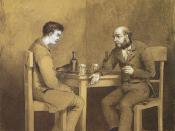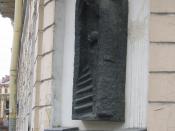Guilt
Guilt is a force in all that has the ability to bring people to insanity. When guilt becomes great enough, the effects it has on people go much deeper than the surface. People's minds and body's are overpowered by the guilt that consumes them every second they live with their burden. The devastating effects of guilt are portrayed vividly in Dostoevsky's fictional but all to real novel Crime and Punishment. In the story, the main character Raskolnikov commits a murder and suffers with the guilt throughout. Eventually his own guilt destroys himself and he is forced to confess. Through Raskolnikov, Dostoevsky bestows on the reader how guilt destroys Raskolnikov's physical and mental well being, which, in time, leads to complete alienation from society.
When one suffers with a great deal of guilt, their physical health quickly deteriorates. Raskolnikov's physical suffering begins shortly after the murder with delusions and nonsense ravings while constantly drifting in and out of reality.
He often goes into a state of "not completely unconscious" but is in a "feverish state, sometimes delirious, sometimes half conscious"(98) while blaming it on his previous sickness. Raskolnikov is being destroyed by his guilt. He is unable to physically live in society while he has such a burden constantly looming over him. When in the police station, Raskolnikov hears talk of the murders and with just a reminder of his crime, he quickly becomes weak. When he "recovered consciousness"(88) the men at the station undoubtedly notice his illness and point out that "he can barely stand upright."(89) His guilt has driven him to a serious state of sickness. He can no longer function normally or even keep consciousness when he is reminded of his crime. Raskolnikov can no longer function normally because his guilt has destroyed...


